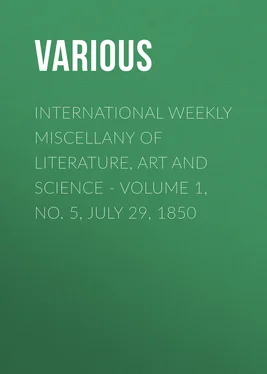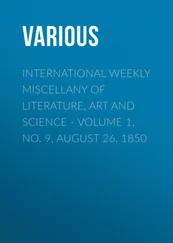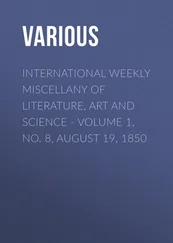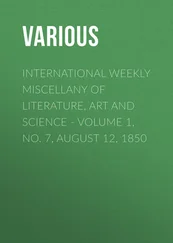Various - International Weekly Miscellany of Literature, Art and Science - Volume 1, No. 5, July 29, 1850
Здесь есть возможность читать онлайн «Various - International Weekly Miscellany of Literature, Art and Science - Volume 1, No. 5, July 29, 1850» — ознакомительный отрывок электронной книги совершенно бесплатно, а после прочтения отрывка купить полную версию. В некоторых случаях можно слушать аудио, скачать через торрент в формате fb2 и присутствует краткое содержание. Жанр: foreign_antique, periodic, foreign_edu, на английском языке. Описание произведения, (предисловие) а так же отзывы посетителей доступны на портале библиотеки ЛибКат.
- Название:International Weekly Miscellany of Literature, Art and Science - Volume 1, No. 5, July 29, 1850
- Автор:
- Жанр:
- Год:неизвестен
- ISBN:нет данных
- Рейтинг книги:5 / 5. Голосов: 1
-
Избранное:Добавить в избранное
- Отзывы:
-
Ваша оценка:
- 100
- 1
- 2
- 3
- 4
- 5
International Weekly Miscellany of Literature, Art and Science - Volume 1, No. 5, July 29, 1850: краткое содержание, описание и аннотация
Предлагаем к чтению аннотацию, описание, краткое содержание или предисловие (зависит от того, что написал сам автор книги «International Weekly Miscellany of Literature, Art and Science - Volume 1, No. 5, July 29, 1850»). Если вы не нашли необходимую информацию о книге — напишите в комментариях, мы постараемся отыскать её.
International Weekly Miscellany of Literature, Art and Science - Volume 1, No. 5, July 29, 1850 — читать онлайн ознакомительный отрывок
Ниже представлен текст книги, разбитый по страницам. Система сохранения места последней прочитанной страницы, позволяет с удобством читать онлайн бесплатно книгу «International Weekly Miscellany of Literature, Art and Science - Volume 1, No. 5, July 29, 1850», без необходимости каждый раз заново искать на чём Вы остановились. Поставьте закладку, и сможете в любой момент перейти на страницу, на которой закончили чтение.
Интервал:
Закладка:
"Well, sir," said she, passing her hands over her cheeks as if to wipe away all blushes and embarrassment, and at the same time pushing her long black curls, moist as they were with perspiration, beyond her ears, "I had an idea which permitted me neither to sleep by day nor night; I said to myself, Reine, you must be satisfied. You must say nothing to any one. You must shut up your shop on Saturday night as you are in the habit of doing. You must take a place in the night diligence and go on Sunday to Marseilles. You will go to see that gentleman, and on Monday morning you can again be at work. All will then be over and for once in your life you will have been satisfied without your neighbors having once fancied for a moment that you have passed the limits of the street in which you live."
"Why, however, did you wish so much to see me? How did you even know that I was here?"
"Thus, Monsieur: a person came to Aix who was very kind to me, for I am the dressmaker of his daughters, having previously been a servant in his mother's country-house. The family has always been kind and attentive, because in Provence, the nobles do not despise the peasants. Ah! it is far otherwise—some are lofty and others humble, but their hearts are all alike. Monsieur and the young ladies knew how I loved to read, and that I am unable to buy books and newspapers. They sometimes lent books to me, when they saw anything which they fancied would interest me, such as fashion plates, engravings of ladies' bonnets, interesting stories, like that of Reboul, the baker of Nimes, Jasmin, the hairdresser of Agen, or Monsieur , the history of your own life. They know, Monsieur, that above all things I love poetry, especially that which brings tears into the eyes."
"Ah, I know," said I with a smile, "you are poetical as the winds which sigh amid your olive-groves, or the dews which drip from your fig trees."
"No, Monsieur, I am only a mantua-maker—a poor seamstress in ... street, in Aix, the name of which I am almost ashamed to tell you. I am no finer lady than was my mother. Once I was servant and nurse in the house of M.... Ah! they were good people and treated me always as if I belonged to the family. I too thought I did. My health however, obliged me to leave them and establish myself as a mantua-maker, in one room, with no companion but a goldfinch. That, however, is not the question you asked me,—why I have come hither? I will tell you."
Truth is altogether ineffably, holily beautiful. Beauty has always truth in it, but seldom unadulterated.
The poet's soul should be like the ocean, able to carry navies, yet yielding to the touch of a finger.
Original Poetry
AZELA
BY MISS ALICE CAREY
From the pale, broken ruins of the heart,
The soul's bright wing, uplifted silently,
Sweeps thro' the steadfast depths of the mind's heaven,
Like the fixed splendor of the morning star—
Nearer and nearer to the wasteless flame
That in the centres of the universe
Burns through the o'erlapping centuries of time.
And shall it stagger midway on its path,
And sink its radiance low as the dull dust,
For the death-flutter of a fledgling hope?
Or, with the headlong phrensy of a fiend,
Front the keen arrows of Love's sunken sun,
For that, with nearer vision it discerns
What in the distance like ripe roses seemed
Crimsoning with odorous beauty the gray rocks
Are the red lights of wreckers!
Just as well
The obstinate traveler might in pride oppose
His puny shoulder to the icy slip
Of the blind avalanche, and hope for life;
Or Beauty press her forehead in the grave,
And think to rise as from the bridal bed.
But let the soul resolve its course shall be
Onward and upward, and the walls of pain
May build themselves about it as they will,
Yet leave it all-sufficient to itself.
How like the very truth a lie may seem!—
Led by that bright curse, Genius, some have gone
On the broad wake of visions wonderful
And seemed, to the dull mortals far below,
Unraveling the web of fate, at will.
And leaning on their own creative power,
As on the confident arm of buoyant Love.
But from the climbing of their wildering way
Many have faltered, fallen,—some have died,
Still wooing from across the lapse of years
The faded splendour of a morning dream,
And feeding sorrow with remembered smiles.
Love, that pale passion-flower of the heart,
Nursed into bloom and beauty by a breath,
With the resplendence of its broken light,
Even on the outposts of mortality,
Dims the still watchfires of the waiting soul.
O, tender-visaged Pity, stoop from heaven,
And from the much-loved bosom of the past
Draw back the nestling hand of Memory,
Though it be quivering and pale with pain;
And with the dead dust of departed Hope
Choke up and wither into barrenness
The sweetest fountain of the human heart,
And stay its channels everlastingly
From the endeavor of the loftier soul.
Nay, 'twere a task outbalancing thy power,
Nor can the almost-omnipotence of mind
Away from aching bind the bleeding heart,
Or keep at will its mighty sorrow down.
And, were the white flames of the world below
Binding my forehead with undying pain,
The lily crowns of heaven I would put back,
If thou wert there, lost light of my young dream!—
Hope, opening with the faint flowers of the wood,
Bloomed crimson with the summer's heavy kiss,
But autumn's dim feet left it in the dust,
And like tired reapers my lorn thoughts went down
To the gloom-harvest of a hopeless love,
For past all thought I loved thee: Listening close
From the soft hour when twilight's rosy hedge
Sprang from the fires of sunset, till deep night
Swept with her cloud of stars the face of heaven,
For the quick music, from the pavement rung
Where beat the impatient hoof-strokes of the steed,
Whose mane of silver, like a wave of light,
Bathed the caressing hand I pined to clasp!
It is as if a song-lark, towering high
In pride of place, should stoop her sun-bathed wing,
Low as the poor hum of the grasshopper.
I scorn thee not, old man; no haunting ghost
Born of the darkness of thy perjury
Crosses the white tent of my dreaming now
But for myself, that I should so have loved!—
The sweet folds of that blessed charity,
Pure as the cold veins of Pentelicus,
Were all too narrow now to hide away
One burning spot of shame—the wretched price
Of proving traitor to the wondrous star
That with a cloud of splendor wraps my way.
And yet, from the bright wine-cup of my life,
The rosy vintage, bubbling to the brim,
Thou With a passionate lip didst drain away
And to God's sweet gift—human sympathy—
Making my bosom dumb as the dark grave,
Didst leave me drifting on the waste of life,
A fruitless pillar of the desert dust;
For, from the ashes of a ruined hope
There springs no life but an unwearied woe
That feeding upon sunken lip and cheek
Pushes its victims from mortality.
Vainly the light rain of the summer time
Waters the dead limbs of the blasted oak.
Love is the worker of all miracles;
And if within some cold and sunless cave
Thou hadst lain lost and dying, prompted not
My feet had struck that pathway, and I could,
With the neglected sunshine of my hair,
Have clasped thee from the hungry jaws of Death,
And on my heart, as on a wave of light
Have lulled thee to the beauty of soft dreams.
Weak, weak imagination! be dissolved
Like a chance snowflake in a sea of fire.
Let the poor-spirited children of Despair
Hang on the sepulchre of buried Hope
The fadeless garlands of undying song.
Though such gift turned on its pearly hinge
Sweet Mercy's gate, I would not so debase me.
Shut out from heaven, I, by the arch-fiend's wing,
As by a star, would move, and radiantly
Go down to sleep in Fame's bright arms the while
Hard by, her handmaids, the still centuries
Lilies and sunshine braided for my brow.
Angel of Darkness, give, O give me hate
For the blind weakness of my passionate love!
And if thou knowest sweet pity, stretch thy wing,
Spotted with sin and seamed with veins of fire,
Between the gate of heaven and my life's prayer.
For loving, thou didst leave me; and, for that
The lowly straw-roof of a peasant's shed
Sheltered my cradle slumbers, and that Morn,
Clasping about my neck her dewy arms,
Drew to the mountains my unfashioned youth,
Where sunbeams built bright arches, and the wind
Winnowed the roses down about my feet
And as their drift of leaves my bosom was,
Till the cursed hour, when pride was pillowed there,
Crimsoned its beauty with the fires of hell.
God hide from me the time when first I knew
Thy shame to call a low-born maiden, Bride!
Methinks I could have lifted my pale hands
Though bandaged back with grave-clothes, in that hour
To cover my hot forehead from thy kiss.
For the heart strengthens when its food is truth,
And o'er the passion-shaken bosom, trail
And burn the lightnings of its love-lit fires
Like a bright banner streaming on the storm.
The day was almost over; on the hills
The parting light was flitting like a ghost,
And like a trembling lover eve's sweet star,
In the dim leafy reach of the thick woods,
Stood gazing in the blue eyes of the night.
But not the beauty of the place nor hour
Moved my wild heart with tempests of such bliss
As shake the bosom of a god, new-winged,
When first in his blue pathway up the skies
He feels the embrace of immortality.
A little moment, and the world was changed—
Truth, like a planet striking through the dark,
Shone cold and clear, and I was what I am,
Listening along the wilderness of life
For faint echoes of lost melody.
The moonlight gather'd itself back from me
And slanted its pale pinions to the dust.
The drowsy gust, bedded in luscious blooms,
Startled, as 'twere at the death-throes of peace,
Down through the darkness moaningly fled off.
O mournful Past! how thou dost cling and cling—
Like a forsaken maiden to false hope—
To the tired bosom of the living hour,
Which, from thy weak embrace, the future time
Jocundly beckons with a roseate hand.
And, round about me honeyed memories drift
From the fair eminences of young hope,
Like flowers blown down the hills of Paradise,
By some soft wave of golden harmony,
Until the glorious smile of summers gone
Lights the dull offing of the sea of Death.
And though no friend nor brother ever made
My soul the burden of one prayer to Heaven,
I dread to go alone into the grave,
And fold my cold arms emptily away
From the bright shadow of such loveliness.
Can the dull mist where swart October hides
His wrinkled front and tawny cheek, wind-shorn,
Be sprinkled with the orange fire that binds
Away from her soft lap o'erbrimmed with flowers,
The dew-wet tresses of the virgin May?
Or can the heart just sunken from the day
Feed on the beauty of the noontide smile?—
O it is well life's fair things fade so soon,
Else we could never take our clinging hands
From Beauty's nestling bosom—never put
The red wine of love's kisses sternly back,
And feel the dull dust sitting on our lips
Until the very grass grew over us.
O it is well! else for this beautiful life
Our overtempted hearts would sell away
The shining coronals of Paradise.
Интервал:
Закладка:
Похожие книги на «International Weekly Miscellany of Literature, Art and Science - Volume 1, No. 5, July 29, 1850»
Представляем Вашему вниманию похожие книги на «International Weekly Miscellany of Literature, Art and Science - Volume 1, No. 5, July 29, 1850» списком для выбора. Мы отобрали схожую по названию и смыслу литературу в надежде предоставить читателям больше вариантов отыскать новые, интересные, ещё непрочитанные произведения.
Обсуждение, отзывы о книге «International Weekly Miscellany of Literature, Art and Science - Volume 1, No. 5, July 29, 1850» и просто собственные мнения читателей. Оставьте ваши комментарии, напишите, что Вы думаете о произведении, его смысле или главных героях. Укажите что конкретно понравилось, а что нет, и почему Вы так считаете.












